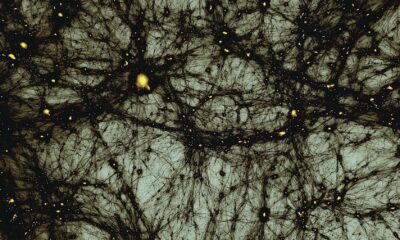Science
Pioneering Dark Matter Experiment Promises to Transform Physics

The search for dark matter, an elusive substance believed to constitute approximately 27% of the universe’s mass, has reached a pivotal moment. Professor Chamkaur Ghag, a leading astroparticle physicist from University College London, heads the LUX-ZEPLIN (LZ) Experiment, the most sophisticated dark matter detector located a mile underground in South Dakota’s Black Hills. He emphasized the significance of this phase in the experiment, stating, “We’ve entered a phase where the sophistication and sensitivity are phenomenal; just a single gram of dust on the cabling could kill the experiment.”
The LZ Experiment aims to identify weakly interacting massive particles (WIMPs), which are among the primary candidates for dark matter. Professor Ghag will discuss the implications of this groundbreaking research at New Scientist Live 2025, set to take place from October 18 to 20, 2025, at ExCeL London.
Significance of the LZ Experiment
Professor Ghag described the LZ Experiment as potentially transformative, marking “the final definitive dark matter experiment for how we’ve been searching for it as a particle.” He likened the search to “building a submarine to find a fish when you don’t know its size or depth,” underscoring the challenge of detecting such an elusive entity. Should WIMPs prove undetectable, he is prepared to pivot, suggesting that dark matter may be lighter than anticipated, possibly interacting with sensitive technologies such as levitating quartz beads held by lasers.
Moreover, the implications of this research extend beyond mere particle detection. Professor Ghag proposed that there could be fundamental misunderstandings regarding gravity, particularly in how quantum mechanics and general relativity intersect. He noted that studying the dynamics of colliding galaxies or planetary orbits might provide insights into dark matter’s gravitational effects.
Potential Impact on Physics and Beyond
A confirmed detection of dark matter would revolutionize physics, establishing “dark matter astronomy” to map its distribution and explore its connections to dark energy. Professor Ghag remarked, “It would be the first sign beyond standard model physics, unlocking the mystery of 85% of the universe’s unknown matter.” Such a discovery could reshape our understanding of the universe’s evolution on both large and small scales.
The concept of dark matter often leads to public misconceptions. Professor Ghag clarified, “That dark matter is dark and that it’s even matter. It’s invisible, and we’ve yet to prove it’s matter,” emphasizing that dark matter is currently understood primarily through its gravitational effects.
The technology developed for the LZ Experiment is already yielding practical applications. Its ultra-low-radiation sensors are enhancing proton beam therapy for cancer treatment, while advancements in chip technology contribute to innovations in Silicon Valley. “Weird, unexpected results generate new tools—that’s the magic of science,” Professor Ghag added.
Looking ahead, he is focused on the XLZD experiment, which may be based at the UK’s Boulby Mine. This initiative aims to deepen our understanding of the dark sector, furthering the global effort to unveil the mysteries of dark matter.
In addition to his research, Professor Ghag is also involved in climate science, teaching a course on climate and energy at UCL and advocating for sustainability. His presentation at New Scientist Live will delve into the profound implications of this cosmic pursuit.
With the LZ Experiment poised either to detect dark matter or prompt a fundamental reevaluation of physics, the upcoming years signal a potentially transformative period in our understanding of the universe. As Professor Ghag concluded, “We’re not just looking for dark matter; we’re probing the very fabric of the universe.”
-

 Entertainment3 months ago
Entertainment3 months agoAnn Ming Reflects on ITV’s ‘I Fought the Law’ Drama
-

 Entertainment4 months ago
Entertainment4 months agoKate Garraway Sells £2 Million Home Amid Financial Struggles
-

 Health3 months ago
Health3 months agoKatie Price Faces New Health Concerns After Cancer Symptoms Resurface
-

 Entertainment3 months ago
Entertainment3 months agoCoronation Street’s Carl Webster Faces Trouble with New Affairs
-

 Entertainment3 months ago
Entertainment3 months agoWhere is Tinder Swindler Simon Leviev? Latest Updates Revealed
-

 Entertainment4 months ago
Entertainment4 months agoMarkiplier Addresses AI Controversy During Livestream Response
-

 World2 weeks ago
World2 weeks agoBailey Announces Heartbreaking Split from Rebecca After Reunion
-

 Science1 month ago
Science1 month agoBrian Cox Addresses Claims of Alien Probe in 3I/ATLAS Discovery
-

 Entertainment2 weeks ago
Entertainment2 weeks agoCoronation Street Fans React as Todd Faces Heartbreaking Choice
-

 Health4 months ago
Health4 months agoCarol Vorderman Reflects on Health Scare and Family Support
-

 Entertainment4 months ago
Entertainment4 months agoKim Cattrall Posts Cryptic Message After HBO’s Sequel Cancellation
-

 Entertainment3 months ago
Entertainment3 months agoOlivia Attwood Opens Up About Fallout with Former Best Friend













